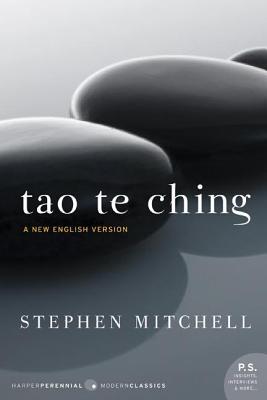The Tao Te Ching (pronounced more like Dow Day Jing) or “Book of the Way” is, simply put, the greatest self-help book of all time. While Lao Tzu’s words of wisdom launched Taoism and influenced Chinese philosophy, Confucianism, and Buddhism, anyone of any religion or belief system could apply its teachings and find themselves living a happy, well-balanced life. I read from the Stephen Mitchell translation, which makes this work feel as fresh and relevant to today’s world as it must have felt 2,500 years ago.
According to Mitchell, Lao Tzu (or Laozi) “may have been an older contemporary of Confucius (551-479 B.C.E.) and may have held the position of archive-keeper in one of the petty kingdoms of the time” (p. vii) but we can’t know for sure. Indeed, Lao Tzu wasn’t even his real name, since the term literally means “Old Master.” Whoever he was, his main teaching was “wei wu wei,” or “doing not-doing,” which is a state of being that Mitchell likens to an athlete or dancer trusting their body to perform without much conscious effort – when someone’s “life is in perfect harmony with the way things are” (p. viii), they become one with the action they undertake. They do it by not doing it at all, but rather by becoming it.
Another main teaching of Tao (the Way) is that “sin” and “evil” aren’t “force[s] to resist” but rather are signs of disharmony that those in harmony should show compassion for (p. ix). There is no good or bad in the universe, just opposing forces that balance each other. For example, without darkness there would be no light, and without light there would be no darkness. Many people fear darkness, equate it with evil, and would dispel it forever if they could, but we need some amount of it in order to sleep properly and maintain our health. However, if the balance of dark and light is tipped too far into darkness, healthful harmony is gone, and all kinds of chaos ensue. When everything is in harmony, there is no good vs bad, just balance. This is what I love about the teachings of Tao – everything in moderation, everything in proper balance, compassion for all, contentment with the way things are. It’s a beautiful way to live.
I tried to limit the amount of quotes I drew from this text, but honestly every single line on every single page is quotable and applicable to anyone’s life or circumstances. If you haven’t already, I strongly encourage you to read this book! It isn’t very long, and it can be life-changing if you allow it to be. But here are a few quotes that spoke to me the loudest:
“When people see some things as beautiful,
other things become ugly.
When people see some things as good,
other things become bad.
Being and non-being create each other.
Difficult and easy support each other.
Long and short define each other.
High and low depend on each other.
Before and after follow each other.
Therefore the Master
acts without doing anything
and teaches without saying anything.” (p. 4)
“In dwelling, live close to the ground.
In thinking, keep to the simple.
In conflict, be fair and generous.
In governing, don’t try to control.
In work, do what you enjoy.
In family life, be completely present.
When you are content to be simply yourself
and don’t compare or compete,
everybody will respect you.” (p. 10)
“We shape clay into a pot,
but it is the emptiness inside
that holds whatever we want.
We hammer wood for a house,
but it is the inner space
that makes it livable.
We work with being,
but non-being is what we use.” (p. 13)
“When the Master governs, the people
are hardly aware that he exists.
Next best is a leader who is loved.
Next, one who is feared.
The worst is one who is despised.” (p. 19)
“For every force there is a counterforce.
Violence, even well intentioned,
always rebounds upon oneself.” (p. 32)
“When man interferes with the Tao,
the sky becomes filthy,
the earth becomes depleted,
the equilibrium crumbles,
creatures become extinct.” (p. 41)
“Be content with what you have;
rejoice in the way things are.
When you realize there is nothing lacking,
the whole world belongs to you.” (p. 46)
“When they think that they know the answers,
people are difficult to guide.
When they know that they don’t know,
people can find their own way.” (p. 67)
(Note: If you’re in the US and are interested in buying a copy of the Stephen Mitchell translation, please consider using this affiliate link to Bookshop.org, where anything you purchase will earn a small commission both for me and for the local independent bookstore of your choice, at no additional expense to you. Thanks for your support!)
Source used:
Tao Te Ching. Edited and translated by Stephen Mitchell. Harper Perennial, 2006.
